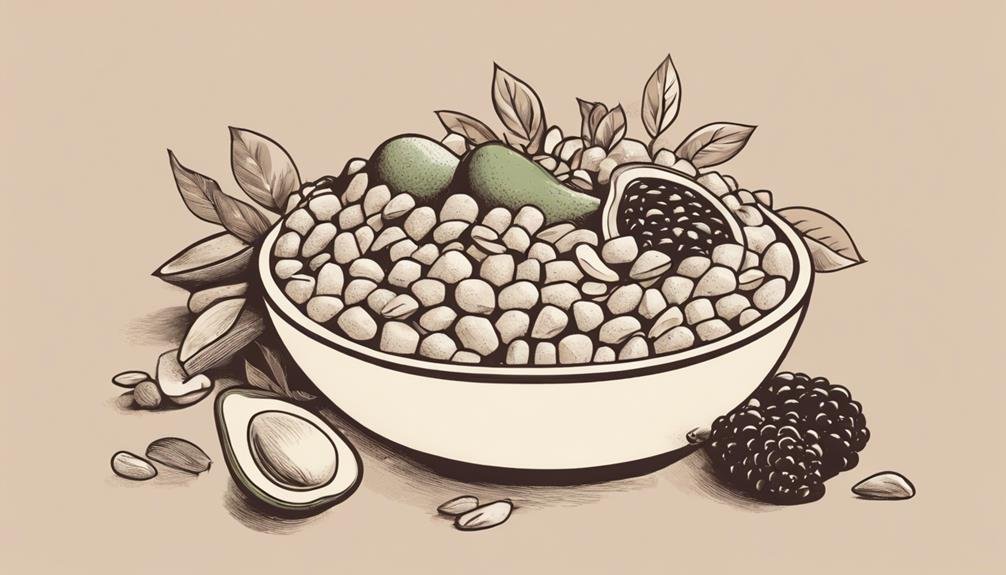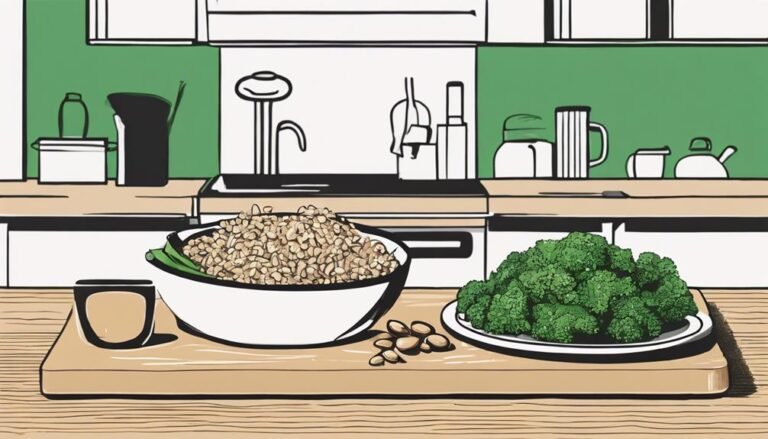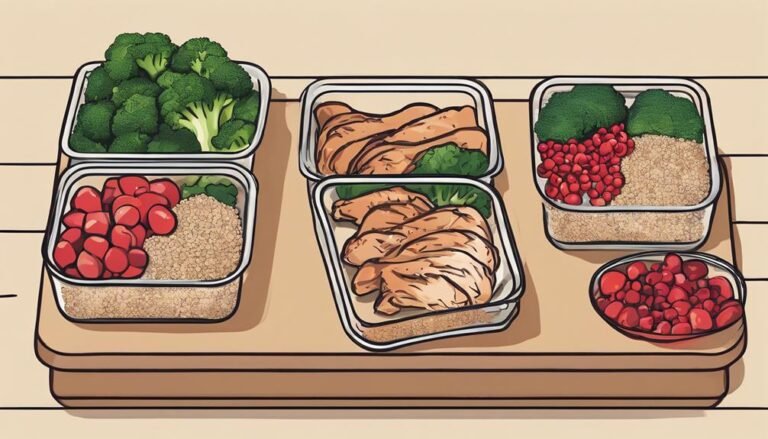High-Fiber Foods for Fit Men After 40
High-fiber foods are essential for you as a fit man over 40. They help improve digestive health and lower the risk of chronic diseases. Incorporate whole grains like oats and quinoa, which provide key nutrients. Don't forget fruits like apples and berries, along with veggies such as broccoli and carrots, to boost your fiber intake. Legumes like lentils and beans are also excellent choices. Snack on nuts and seeds like almonds and chia seeds. Simply making these dietary changes can enhance your overall health. There's so much more to explore about maintaining a healthy lifestyle in this stage of life.
Key Takeaways
- Whole grains like oats and quinoa are essential for heart health and provide sustained energy for active lifestyles after 40.
- Fruits such as raspberries, pears, and apples are high in fiber and antioxidants, promoting digestive health and overall wellness.
- Incorporating legumes like lentils and chickpeas can boost protein intake while enhancing fiber consumption, supporting muscle maintenance.
- Vegetables like broccoli and Brussels sprouts offer vital nutrients and fiber, helping to reduce the risk of chronic diseases.
Importance of Fiber After 40
As you hit 40, increasing your fiber intake becomes essential for maintaining digestive health and reducing the risk of chronic diseases.
Fiber plays an important role in digestion by promoting regular bowel movements and preventing constipation, which can become more common with age.
Additionally, a high-fiber diet helps regulate blood sugar levels and lowers cholesterol, reducing your risk of heart disease.
It also aids in weight management by keeping you feeling full longer, which can be particularly beneficial as metabolism tends to slow down.
By incorporating more fiber into your diet, you're not only supporting your digestive system but also enhancing your overall health and longevity.
Making this adjustment now can lead to significant benefits in the long run.
Top High-Fiber Foods
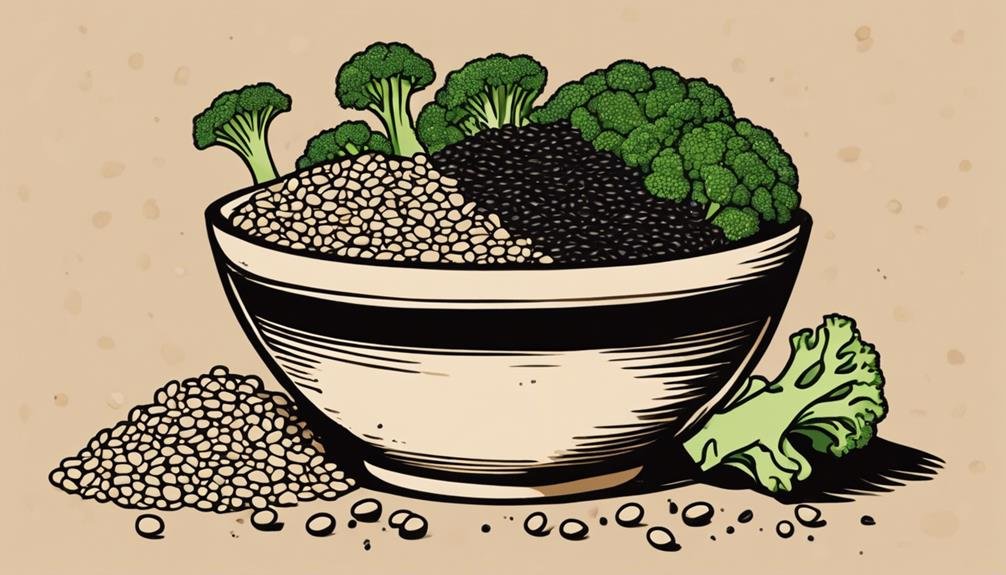
Incorporating top high-fiber foods into your diet can greatly enhance your digestive health and overall well-being after 40.
Start by adding whole grains like oats and quinoa, which provide essential nutrients and keep you feeling full longer.
Fruits like apples, pears, and berries aren't just delicious; they're packed with fiber and antioxidants.
Vegetables such as broccoli, Brussels sprouts, and carrots can elevate your fiber intake while delivering vitamins and minerals.
Don't forget nuts and seeds, like almonds and chia seeds, which offer healthy fats along with fiber.
Legumes and Pulses
Legumes and pulses are excellent sources of fiber that can boost your health after 40, providing essential nutrients while helping to maintain a healthy weight.
Incorporating these foods into your diet can enhance digestion and reduce the risk of chronic diseases. Here are some great options to contemplate:
- Lentils: Packed with protein and iron, they're perfect in soups or salads.
- Chickpeas: Versatile and tasty, they can be roasted for a crunchy snack or blended into hummus.
- Black beans: Rich in antioxidants and great for burritos or chili.
- Kidney beans: Excellent in stews and provide a hearty texture.
Start enjoying these fiber-rich foods today!
Whole Grains Benefits
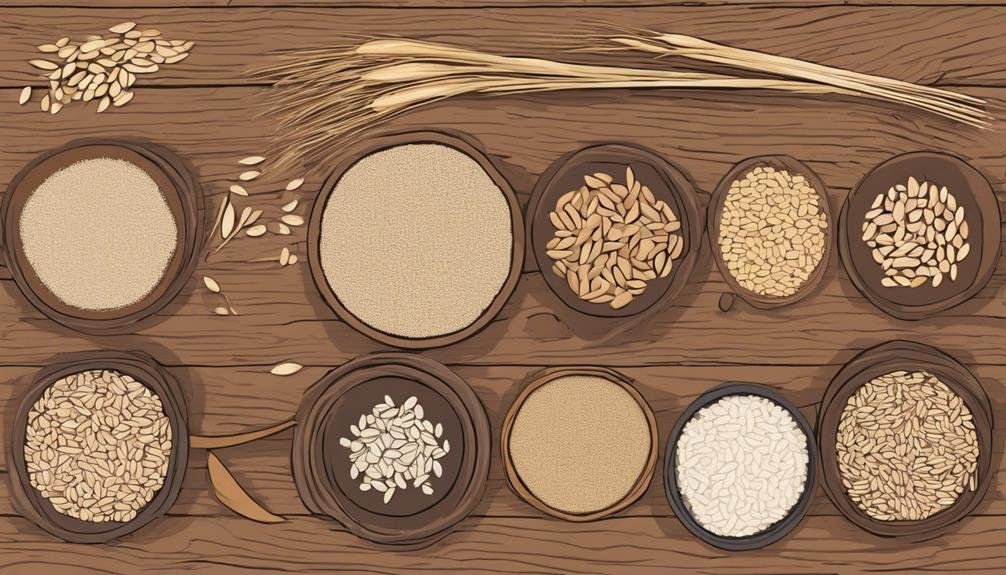
Whole grains are another fantastic way to increase your fiber intake, supporting heart health and digestion as you age. Incorporating whole grains into your diet can help you maintain a healthy weight, reduce cholesterol levels, and stabilize blood sugar. Plus, they're versatile and easy to add to meals.
Here's a quick look at some popular whole grains and their benefits:
| Whole Grain | Benefits |
|---|---|
| Oats | Lowers cholesterol, boosts heart health |
| Quinoa | Complete protein, high in fiber |
| Brown Rice | Regulates digestion, provides energy |
| Barley | Reduces risk of heart disease |
Make whole grains a staple in your meals, and you'll reap the benefits for your overall health and well-being!
Fruits With High Fiber
Eating a variety of high-fiber fruits can greatly improve your digestive health and provide essential vitamins and minerals as you age. Incorporating these fruits into your diet not only boosts fiber intake but also keeps your energy levels up.
Here are some top choices you should consider:
- Raspberries: Packed with fiber, they're delicious in smoothies or on top of yogurt.
- Pears: With their skin on, they offer a satisfying crunch and plenty of fiber.
- Apples: A convenient snack that's high in fiber and vitamins.
- Bananas: Great for energy, they're also a good source of potassium.
Make these fruits a staple in your diet for peak health!
Vegetables for Optimal Health
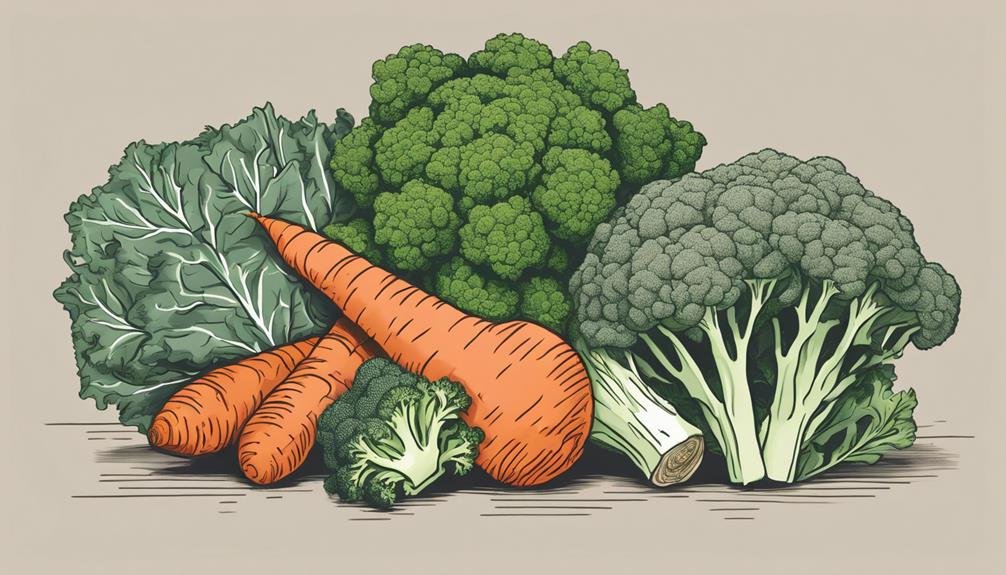
Incorporating a variety of high-fiber vegetables into your diet can greatly enhance your overall health and well-being as you age.
Leafy greens like spinach and kale are packed with essential vitamins and minerals, while cruciferous vegetables such as broccoli and Brussels sprouts support digestion and may lower cancer risks.
Don't forget about colorful options like bell peppers and carrots; they're rich in antioxidants that protect your cells.
Aim for at least three servings of vegetables daily to meet your fiber goals.
Experiment with different cooking methods—steaming, roasting, or even raw in salads—to keep meals exciting.
Nuts and Seeds Choices
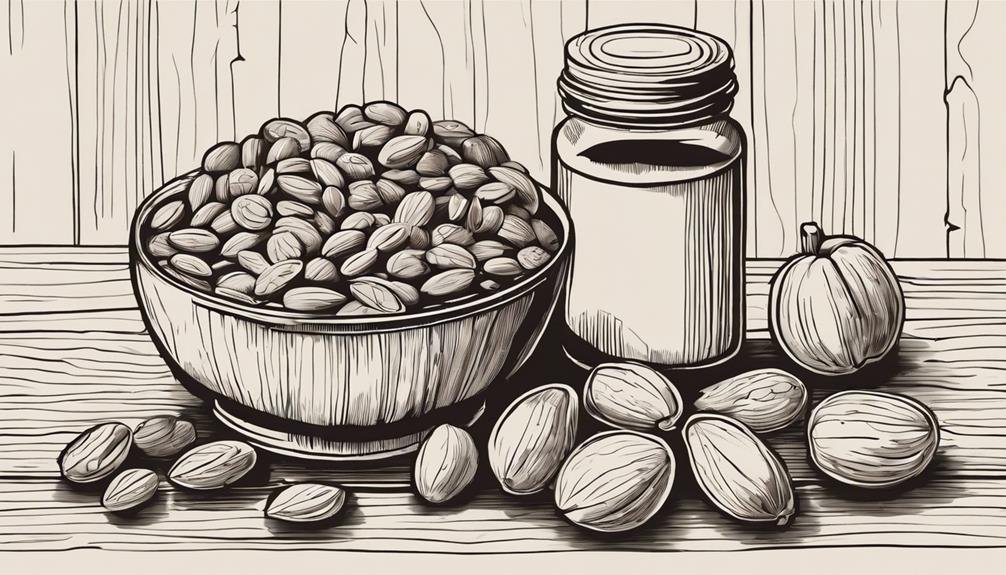
Nuts and seeds are often overlooked but can be a fantastic source of high fiber and essential nutrients for men over 40. Incorporating these into your diet can improve digestion, support heart health, and provide lasting energy.
Here are some excellent choices to evaluate:
- Almonds: Packed with fiber and vitamin E, they're perfect for snacking.
- Chia seeds: These tiny seeds are fiber giants and can be added to smoothies or yogurt.
- Walnuts: Rich in omega-3 fatty acids, they also offer a good fiber boost.
- Pumpkin seeds: A great source of magnesium and iron while being high in fiber.
Add these to your meals for a nutritious punch!
Meal Planning for Fiber
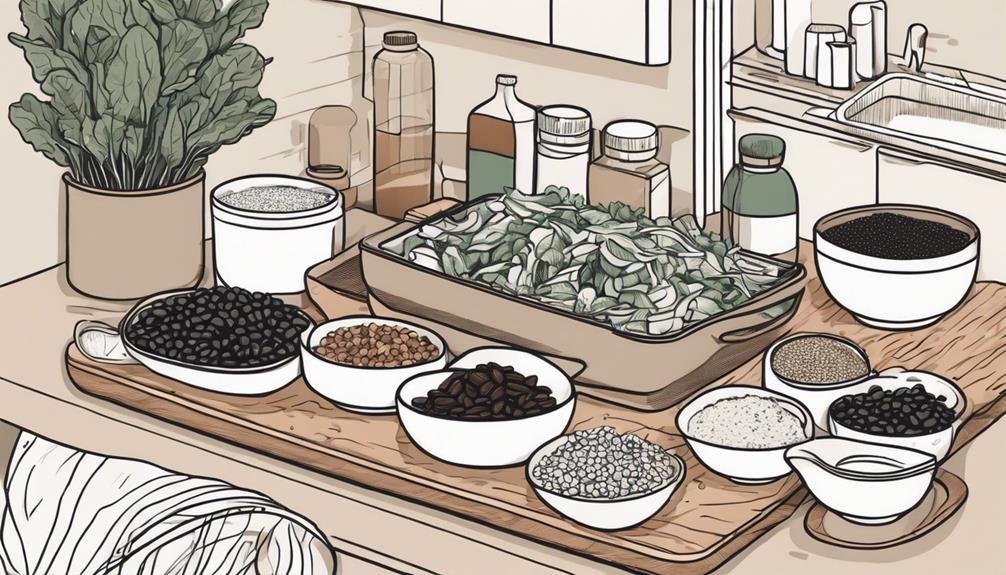
Planning meals with high-fiber ingredients like those found in nuts and seeds can greatly enhance your overall health and well-being after 40.
Start by incorporating a variety of fiber-rich foods into your weekly menu. Think whole grains, fruits, vegetables, and legumes.
For breakfast, mix oats with chia seeds and fresh berries. At lunch, enjoy a quinoa salad packed with black beans and colorful veggies. Dinner can feature roasted vegetables alongside a hearty lentil soup.
Don't forget healthy snacks—almonds or carrot sticks can keep you satisfied between meals.
By intentionally selecting meals rich in fiber, you'll improve digestion, boost energy, and support heart health.
Meal planning can be a game changer for your overall wellness journey.
Tips for Increasing Fiber Intake
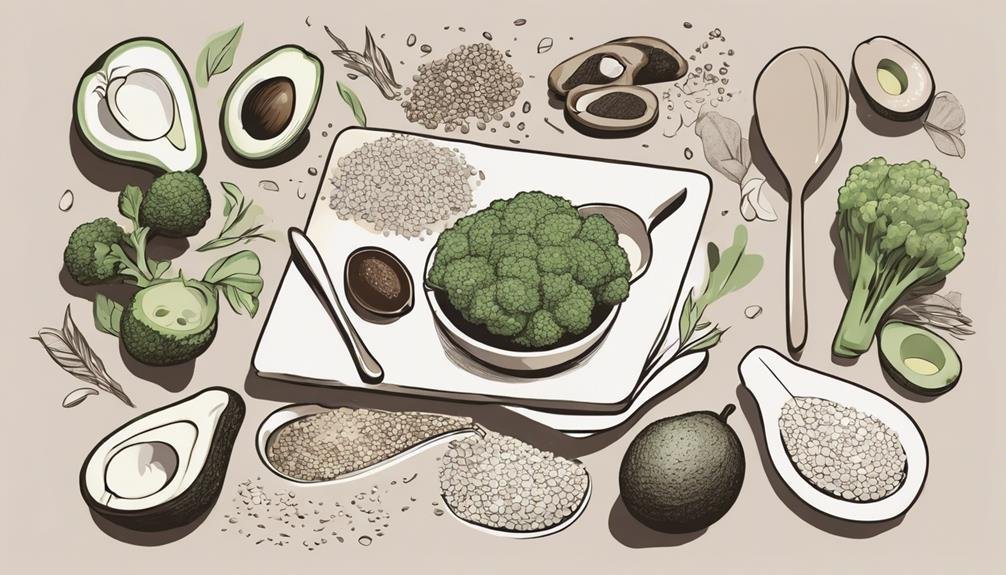
Boosting your fiber intake can be as simple as swapping out refined grains for whole grains in your meals. Here are a few more tips to help you increase your fiber consumption:
- Add legumes like beans, lentils, and chickpeas to salads, soups, or stews.
- Snack on fruits and veggies; consider raw carrots, apples, or berries for a fiber boost.
- Choose whole grain snacks such as popcorn or whole grain crackers instead of chips.
- Incorporate chia or flax seeds into smoothies or yogurt for an extra fiber kick.
These small changes can make a big difference in your overall health and well-being!
Questions
Can Fiber Help With Weight Loss After 40?
Yes, fiber can help with weight loss after 40. It keeps you feeling full longer, stabilizes blood sugar, and supports digestion. Incorporating more fiber into your diet can make managing weight easier and more effective.
What Are the Symptoms of Fiber Deficiency?
Imagine a garden struggling without water; similarly, your body suffers from fiber deficiency. You might experience constipation, bloating, fatigue, or irregular bowel movements. Incorporating fiber-rich foods helps keep your digestive system flourishing and healthy.
How Much Fiber Should Men Over 40 Consume Daily?
You should aim for about 30 grams of fiber daily. It helps maintain digestive health, lowers cholesterol, and supports weight management. Incorporating a variety of fruits, vegetables, and whole grains can easily help you reach that goal.
Are There Any Side Effects of Too Much Fiber?
Yes, consuming too much fiber can lead to bloating, gas, and digestive discomfort. It's important to gradually increase your fiber intake and drink plenty of water to help your body adjust effectively.
Can Fiber Improve Heart Health in Older Men?
Yes, fiber can improve heart health in older men. It helps lower cholesterol levels, regulate blood pressure, and maintain a healthy weight. Incorporating fiber-rich foods into your diet supports overall cardiovascular well-being.
Conclusion
Incorporating high-fiber foods into your diet after 40 is essential for maintaining ideal health and preventing chronic diseases.
Did you know that men aged 40 and older should aim for at least 30 grams of fiber daily?
By focusing on legumes, whole grains, fruits, vegetables, and nuts, you can easily meet this goal.
So, start planning your meals with these fiber-rich options and enjoy the benefits of improved digestion and heart health as you age gracefully.

